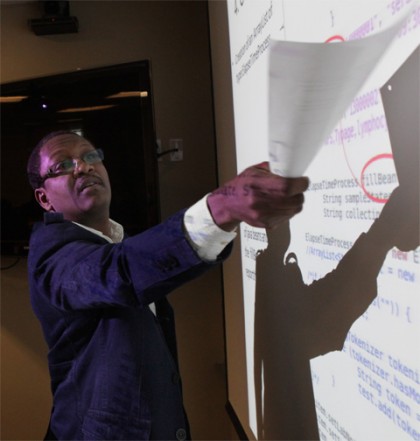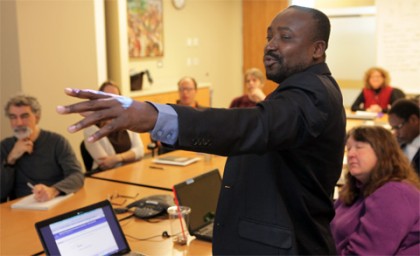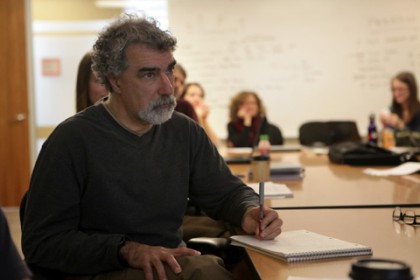The weather has been rainy, and the midwinter days are short, but for two software developers from Côte D’Ivoire, four mid-winter weeks in Seattle offer a rare chance to develop skills under the close mentorship of University of Washington I-TECH experts.

“There is no opportunity in Côte D’Ivoire to build software development skills like this,” said Dr Constant Kone on a recent afternoon as the grey Seattle rain pelted against the window of his borrowed office at I-TECH. His colleague Mr Kamalan Fourier, typing intently on his laptop across the table they share, nodded in agreement.
For several years, I-TECH has coordinated the implementation of the OpenELIS software in national public health laboratories in Côte D’Ivoire, an effort that is led by a highly skilled UW-based health informatics team. The open source laboratory informatics software was customized by the I-TECH team to match the workflow and local needs in Côte D’Ivoire.
But after the initial push to develop and install the software, there was a need for ongoing support, bug fixes, and additional features. “We get continual requests to add new features,” says Jen Antilla, a training specialist on the Seattle team, “for example to respond to new lab processes or build new reports that users need. And like any software, there will always be bugs to fix. We want to build the capacity to respond to those requests locally, in the labs where OpenELIS is running.”

Like all I-TECH programs, the Côte D’Ivoire deployment of Open ELIS is on a trajectory towards local ownership and sustainability, but that path is made more complicated by the lack of skilled software developers in Côte D’Ivoire. I-TECH began recruiting for local software developers in April 2012, and recognizing that most applicants would require additional training, the team started designing a custom training course to build the Open ELIS development skills of the new hires in Côte D’Ivoire.
As the first trainees, Dr Kone and Mr Fourier are in Seattle for four weeks, which is the intensive first phase of a planned nine month training program that will continue remotely after they return home.
Central to the training is a problem-based curriculum developed by Antilla and her colleagues, which moves the learners through a typical software development cycle: gathering requirements, designing the solution, developing it into the Open ELIS codebase, and testing it before implementation.

“It gives them the opportunity to learn about the different facets of Open ELIS as well as the tools and process needed to build a new feature,” says Antilla. “And to do so under the direct guidance of a mentor who’s spending lots of face-to-face time with them. When they return to Côte D’Ivoire they will continue with similar exercises a few hours each week, under a remote mentorship of our team, for the next 8 months.”
In the next few months Open ELIS will be fully implemented at a new site in Côte D’Ivoire, the lab at the Institut Pasteur. For the first time there will be local developers on-site with the skills to solve problems locally for their colleagues, with ever-decreasing support from Seattle.
And the I-TECH team in Seattle looks forward to having skilled colleagues at the point of deployment, sharing of the load.
“There’s nothing quite like having the opportunity to build a personal relationship over 4 weeks together in Seattle,” said Paul Schwartz, the senior software engineer on the Seattle team. “I look forward to working shoulder to shoulder with them after they return. Even when those shoulders are half a world away in West Africa!”